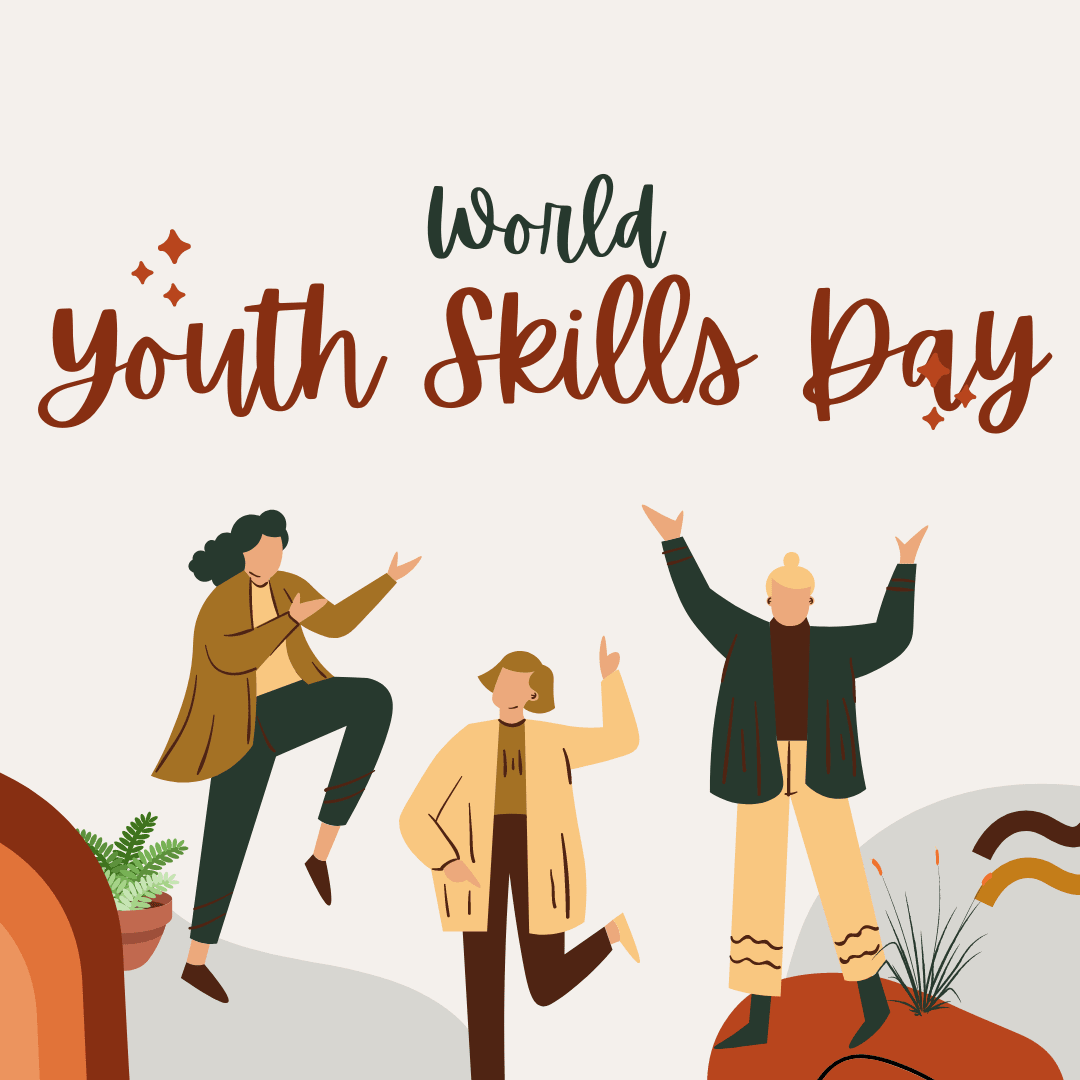“The youth need to be enabled to become job generators from job seekers.” — A. P. J. Abdul Kalam, Former President of India
Introduction
World Youth Skills Day, celebrated on July 15th, emphasizes equipping young people with skills crucial for employment, entrepreneurship, and civic engagement. This day plays a pivotal role in promoting peace and sustainable development by empowering youth globally.
In this article, we will explore how youth skills contribute to peace and development, focusing on various dimensions and providing real-life case studies to illustrate these contributions which impact development of youth skills globally.
Why World Youth Skills Day is Celebrated

Started in 2014 by the United Nations, World Youth Skills Day raises awareness about investing in youth skills development to addresses high youth unemployment rates and social inequality. It advocates for education and training to harness young people’s potential.
Importance of Youth Skills for Peace and Development
Investing in youth skills builds inclusive societies and promotes economic stability. By equipping youth with necessary skills, we enable them to actively contribute to their communities, driving positive social change and fostering peaceful coexistence.
Theme for 2024: “Youth Skills for Peace and Development”
The 2024 theme underscores how youth skills can achieve global peace and sustainable development goals. It emphasizes empowering young people as agents of change who can drive these goals forward.
How Youth Skills Contribute to Peace and Development

Social Cohesion and Community Building:
Youth with effective communication and teamwork skills bridge cultural divides. Initiatives like the “Youth Leadership Program” foster cross-cultural understanding and community resilience.
Case Study: Youth Leadership Program (YLP)
Overview: The Youth Leadership Program (YLP) equips young leaders in conflict zones with crucial skills in leadership, conflict resolution, and community engagement. Led by international organizations and local NGOs, the YLP aims to foster peace among diverse youth.
Objectives:
- Promote Peaceful Coexistence: Teach conflict resolution to reduce violence.
- Empower Youth Leaders: Drive social cohesion and resilience.
- Build Networks: Establish peacebuilding and community development.
Implementation:
Participants undergo intensive training in negotiation, mediation, and leadership to manage conflicts effectively.
Impact:
- Promoting Dialogue: YLP graduates initiate dialogues and mediate disputes.
- Community Engagement: Lead initiatives addressing local challenges and advocating for youth inclusion.
Success Story: YLP efforts facilitated a ceasefire and built trust among community members.
Conclusion:
The Youth Leadership Program illustrates how investing in youth skills cultivates resilient societies. Celebrating initiatives like YLP on World Youth Skills Day underscores their vital role in a harmonious and prosperous world.
Conflict Resolution and Mediation:
Youth trained in conflict resolution and mediation mitigate conflicts in conflict-affected regions. Organizations like the “Youth Peace Network” empower young leaders, facilitating peaceful resolutions and reconciliation.
Case Study: Seeds of Peace
Overview: Seeds of Peace unites youth from conflict zones to foster dialogue and reconciliation. Established in 1993, it empowers young leaders with skills for peacebuilding and conflict resolution.
Objectives:
- Promote Understanding: Facilitate dialogue and mutual respect among conflicted youth.
- Build Relationships: Create networks of peace advocates.
- Empower Change: Equip participants with leadership skills for community impact.
Implementation:
Participants engage in programs focused on dialogue, leadership, and teamwork to challenge stereotypes and build empathy.
Impact:
- Cross-Border Relationships: Alumni maintain friendships and collaborate on peace initiatives.
- Community Initiatives: Graduates lead projects promoting tolerance and sustainable development.
Success Story: Alumni contribute to global peace efforts, showcasing long-term program impact.
Conclusion:
Seeds of Peace demonstrates how investing in youth transforms conflict into cooperation. Celebrating initiatives like Seeds of Peace on World Youth Skills Day highlights their role in fostering a unified and peaceful world.
Economic Development and Employment:
Youth skills development stimulates economic growth and reduces poverty. Initiatives like the “Youth Employment Initiative” offer vocational training and job placements, enhancing employability and local economic development.
Case Study: Youth Employment Initiative (YEI)
Overview: Launched by the European Union in 2013, YEI targets regions with high youth unemployment, providing vocational training and job placements to promote economic growth and social inclusion.
Objectives:
- Reduce Unemployment: Provide youth with skills and job opportunities.
- Promote Growth: Support local economies through workforce development.
- Ensure Inclusion: Increase access to education and employment.
Implementation:
YEI funds vocational training and apprenticeships, partnering with employers to match youth skills with market needs.
Impact:
- Job Placement: Thousands of youths have secured employment through YEI programs.
- Economic Boost: Participants contribute to local economies through increased productivity.
- Long-term Benefits: Enhance youth employability and economic independence.
Success Story: YEI initiatives in Southern Europe have notably reduced youth unemployment rates, empowering young people with skills crucial for career advancement and economic resilience.
Conclusion:
The Youth Employment Initiative exemplifies effective investment in youth skills, driving economic growth and social equity. Celebrating initiatives like YEI on World Youth Skills Day underscores their role in creating pathways to sustainable employment and prosperity globally.
Entrepreneurship and Innovation:
Entrepreneurial skills empower youth to create sustainable businesses addressing local challenges. Initiatives like “Startup Youth” support young entrepreneurs with mentorship and funding, driving inclusive growth and community development.
Case Study: Ecofemme
Overview:
Ecofemme promotes menstrual health and sustainable menstruation practices in India since 2010. It offers eco-friendly menstrual products and hygiene education.
Objectives:
- Promote Menstrual Health: Provide sustainable menstrual products and hygiene education.
- Empower Women: Support women’s health and well-being through awareness.
- Environmental Sustainability: Reduce the ecological impact of menstrual products.
Implementation: Ecofemme produces cloth pads using eco-friendly materials and distributes them in rural areas. It conducts workshops on menstrual hygiene and sustainable living.
Impact:
- Health: Improves menstrual health with safe products.
- Empowerment: Enhances knowledge and confidence in menstrual hygiene.
- Environment: Reduces waste compared to disposable products.
Success Story: Ecofemme’s initiatives have reached thousands of women in India, promoting menstrual health and sustainable living. It empowers women economically through cloth pad production and distribution, creating local employment.
Conclusion:
Ecofemme demonstrates how social enterprises address health, environmental, and socio-economic challenges through innovative solutions. Celebrating initiatives like Ecofemme on World Youth Skills Day highlights their impact on sustainable development and women’s empowerment globally.
Global and Local Initiatives
International Collaborations and Partnerships
Global initiatives like the United Nations’ Sustainable Development Goals prioritize youth empowerment and skills development for inclusive growth and sustainable development. Collaboration with governments, international organizations, and civil society scales up youth skills programs for global impact.
Local Innovations and Best Practices
Youth-led projects and grassroots initiatives showcase the transformative potential of youth skills in community development. Organizations like “Youth for Sustainability” engage young people in environmental conservation through education and advocacy, contributing to local resilience and sustainable outcomes.
Challenges and Solutions
Barriers to Youth Skills Development
Limited access to quality education, training opportunities, and socioeconomic inequalities hinder youth skills development. Addressing these challenges requires inclusive policies and partnerships to ensure equitable access to education and skills training.
Strategies for Overcoming Challenges
Governments and organizations can implement inclusive policies, expand vocational training, and invest in digital literacy. Public-private partnerships enhance the relevance of youth skills programs, meeting labor market demands and driving economic growth.
How to Get Involved
Individual and Collective Action
Support youth skills development through mentorship, participation in youth initiatives, and advocacy for education and training policies. Civil society and youth networks mobilize communities to prioritize youth skills for peace and development.
Corporate Responsibility and Philanthropy
Businesses contribute to youth skills development through CSR initiatives, workforce training, and educational partnerships. Investing in youth prepares skilled workers and future leaders, driving social impact and economic development.
Conclusion
Youth skills are pivotal for fostering peace, prosperity, and societal progress. Investing in education, vocational training, and entrepreneurship empowers young people to drive innovation and resilience in their communities. Initiatives like the Youth Leadership Program, Seeds of Peace, the Youth Employment Initiative, and Ecofemme demonstrate how targeted investments in youth yield lasting impacts.
As we celebrate World Youth Skills Day, let’s unite to empower the next generation, ensuring they have the skills and opportunities to shape a sustainable and peaceful future. Together, we can cultivate a world where every young person thrives and contributes to global prosperity.







